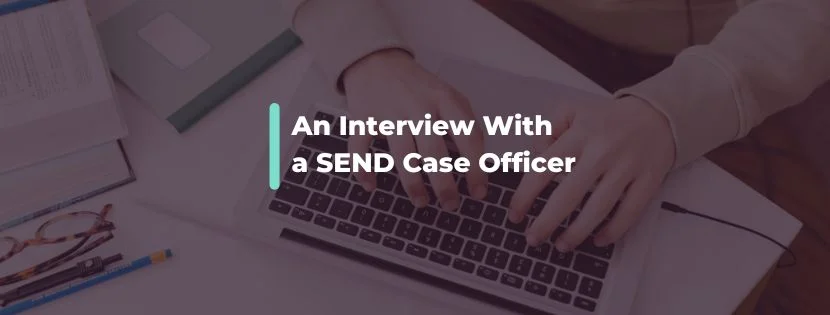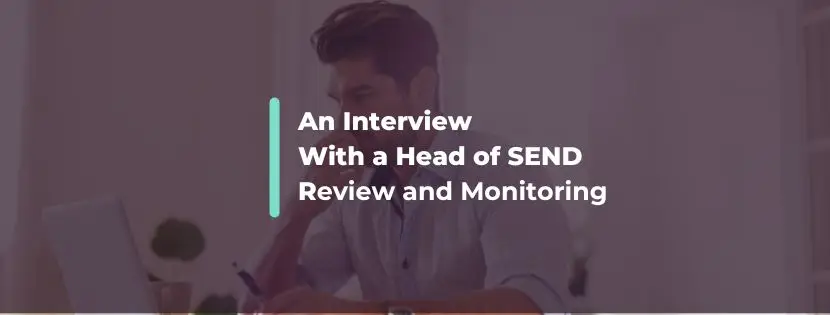A SEND Casework Officer's View: Fewer EHC Plans, Stronger Partnerships
15 Oct, 20241-2 minutes
In this blog, you will learn:
- About the importance of working with local authority SEND professionals
- About whether it would be more beneficial to have less EHC plans.
- How to find and apply for the best SEND Case Officer jobs.
SEND Casework Officers play a key role in supporting children and young people with Special Educational Needs and Disabilities (SEND). They attend annual reviews and develop, implement and oversee Educational Health Care (EHC) plans to manage EHC needs assessments. But do EHC plans actually work and how can they be improved?
We recently interviewed a SEND Casework Officer who has played a critical role correlating the necessary documents that relate to EHC plans and assessments since 2017. He identifies students with SEND and ensures that a child or young person with SEND receives appropriate support.
Despite working remotely, this SEND Casework Officer understands the importance of working with families and schools and liaising with other industry professionals. This individual gathers all the necessary information and ensures all parties are kept up to date throughout the EHCP process.
In this interview with a SEND Casework Officer, we explore his views on how the quality and content of EHC plans have improved over the years, and how there are other ways to support all pupils with and without SEND.
Can you start by telling us a bit about your career background and how you got into the role of a SEND Casework Officer?
I was a Teacher for about nine years, and was finding (like a lot of Teachers) that burnout was taking its toll and affecting my home life. I loved working in education though, and whilst looking for non-classroom roles I found a SEND Case Officer position at my Local Authority.
I didn’t really have a clue what it would involve but I went for it, and I’m still working in SEND support today seven years later!
What does a typical day look like for you as a SEND Casework Officer in a local authority?
I work remotely so my day starts as soon as the kids are out of the house! I start by confronting my email inbox, which if not monitored would grow by about fifty emails a day and quickly become unmanageable.
I scan through for anything that can be deleted or forwarded, and anything that needs immediate attention. I could easily spend the whole day responding to emails and the actions that come from them, but unfortunately I don’t have that time, so the skill of quickly spotting priority emails is a must-have. The rest will have to wait.
I then move on to my own ‘to do’ list, which is a spreadsheet I keep on my desktop, with a Red, Amber and Green (RAG) rating for urgency. I use the calendar on my Outlook to block out time to devote to certain tasks, whether that’s EHCP writing, attending annual reviews, taking cases to panel to secure funding, calling worried parents, meeting with schools where there’s a risk of exclusion, consulting with schools for new placement, etc - the list goes on!
That’s pretty much my whole day - working on my to-do list of allocated cases and making sure everything is properly recorded on the system - there must be a record of everything that is done.
How do you manage your workload and prioritise your time?
The only way to get through it all (for me) is to block out the time on my calendar, so an alert comes up to remind me to do it, and I focus only on that (as much as possible) until it’s done. If the task doesn’t get done, I will move it to another space on my calendar and return to it then.
Who do you work with on a daily basis?
I work from home, which although it has a lot of benefits, does mean that I’m working alone most of the day. I call parents and schools when necessary, and wherever possible try to bring them together via Teams to discuss concerns and work towards positive solutions.
I also liaise with a lot of linked professionals such as Educational Psychologists, Family Support Workers and Social Workers. I always keep the young person at the centre of any discussion - and involved in the discussion, if possible!
Can you share a memorable case or moment in your career where you felt you made a real difference in a child's or young person’s life?
I worked closely on a case involving a young person on the verge of adulthood, whose physical and mental health issues were so severe they needed 3:1 support and there was frequent involvement of the emergency services. I increased contact to weekly meetings with the setting and family to monitor and document progress and talk openly about next steps and when it would be appropriate to take them.
It was a difficult journey with lots of ups and downs, but as soon as there was stability I made sure I was ready to support colleagues from health and social care in finding an education placement which would facilitate the pathway towards independence and adulthood.
It didn’t always work, and at times had to be paused or stopped, but the young person is now living in supported accommodation and is doing volunteer work in their area of interest, building experience towards hopefully a positive career. I feel that without that close involvement and commitment from all parties, the young person could easily have missed out on opportunities to develop.
What is the biggest challenge in managing cases of children with complex needs, and how do you overcome it?
The biggest challenge is without doubt the workload. All SEND Case Officers care a great deal about doing the best possible job for the children and young people on their caseload, but it’s almost impossible to give as much focus and time to each individual case as you would like. It’s a part of the job and you just have to give 100% for as many young people as you can, for as long as you can.
What’s the most valuable lesson that you’ve learned in your career?
I have mainly worked in Post-16 roles, and with college-age students especially, it can be difficult to monitor progress, because a student may start a course in September, realise they don’t like it by October, go get a job, realise they don’t like that and apply to return to college by November!
The main thing is to maintain close working relationships with the schools and colleges, constantly checking up on names you may not have heard for a while, and asking the setting to let you know well in advance if there’s a possibility anyone may leave their course.
That also works for updating EHCPs - it’s worth having a shared spreadsheet of names with the due date of the next annual review, and keeping a close eye on it.
How have things changed or progressed in the SEND sector since the start of your career?
The quality of EHCPs is a lot better now than when I first started in SEND. I think there’s much more commonality in the style and content of EHCPs across local authorities now, which makes them more portable with even more focus on needs and outcomes.
Reform in the SEND sector continues to be a huge topic of discussion, what changes would you like to see happen in the SEND sector and why?
It may seem counterintuitive, but I’d actually like to see fewer EHCPs. In an ideal world all schools would be equipped with the knowledge and resources to support all pupils, with additional needs and without.
That requires working with local authorities to look at strategies to implement before requesting an EHCP, using really robust and pro-active graduated responses. That way, those who still need provision above and beyond what schools can provide will receive a really focused and rigorous level of support from their local authorities.
What advice would you give to someone who is just starting out in their career as a SEND professional?
My advice would be to make friends with as many Special Educational Needs Coordinators (SENCOs), Educational Psychologists, Social Workers, Inclusion Officers and any other professionals as possible, as soon as possible. You can’t do this job alone, and you need as many people on your side as you can get!
SEND Case Officer jobs
If you’re searching for your next SEND Case Officer job, why not take a look at the latest vacancies, or simply upload your CV to be notified when a relevant position becomes available.
Discover more content like this including:
What are common challenges for SEND Case Officers?
SEND Case Officer interview questions and answers
As well as more interviews from SEND Case Officers including.
A day in the life of a SEN Case Officer
The power of communication: an interview with a SEND Case Officer
From teaching assistant to SEND Team Manager, the career journey of a SEND Case Officer
Recruit SEND Case Officers
As specialist local authority SEND recruiters, we support local authorities nationwide with their temporary, interim and permanent staffing needs.
If you’re struggling to recruit, we have exclusive access to some of the most experienced SEND Case Officers in the UK.
If you’re struggling to fill a vacancy, why not get in touch with one of our team to see how we can help?
South of the UK - Richard Shorrock
Midlands & North of the UK - Adam Zyda
Share your experience
Every individual brings a unique set of experiences, thoughts, and insights to the table. We believe in giving a voice to a community of professionals to inspire positive change and champion reform in the SEND sector.
If you work in the SEND sector and would like to share your own personal and professional experiences, we’d love to hear from you. Perhaps you have a different perspective, could offer a fresh angle, or want to challenge assumptions.
Simply reach out to our Head of Content, Nicole Sherwood, to discuss a collaboration which makes your voice count.
Who is Spencer Clarke Group?
Established in 2017, we’re a vibrant and progressive recruitment agency based in the heart of the North West.
We continually reimagine the recruitment process to challenge convention and defy expectations; from creating a better recruitment experience to remodelling employee engagement, we thrive off doing things differently and turning heads along the way.
We operate in two sectors:
In eleven specialisms:
Healthcare, Social Care & Nursing
Corporate Functions & Business Support




